
In a rapidly growing e-commerce market, Temu, a Chinese platform that entered Nigeria in November 2024, has sparked both excitement and controversy. While many consumers are attracted by its low prices and promises of free shipping, others are voicing growing concerns over the platform’s trustworthiness and product quality.
Temu’s entry into the Nigerian market was marked by an aggressive marketing campaign offering products at wholesale prices by cutting out middlemen. The platform has earned significant attention for its affordable prices and direct-from-factory business model, but its offerings have also generated mixed reactions from customers.
Despite some positive reviews, with users praising the platform for timely delivery and reasonable prices, many customers are dissatisfied. A number of users have reported receiving subpar products, contradicting the marketing promises of high-quality items. Temu’s “free gift” promotions, which require consumers to meet high spending thresholds, have also been criticized as deceptive, with customers feeling misled by the platform’s marketing tactics.
Social media platforms like TikTok and Nairaland have seen an influx of complaints from consumers who feel they’ve been duped. From receiving toy versions of microwaves to low-quality fans that don’t match the product descriptions, customers are speaking out about their negative experiences.
Funmi, a Lagos resident, shared her disappointment with the platform, stating that after receiving a batch of low-quality dresses from her first order, her attempt to cancel a second order was blocked. Others have reported issues with refunds and shipping costs for returning faulty items to China.
In response to these concerns, Temu has assured customers that it takes feedback seriously and is committed to improving its services. The platform has emphasized its efforts to enforce quality standards through a strict seller onboarding process and regular product checks. It also clarified that its promotional offers are genuine, with terms and conditions clearly outlined for transparency.
Despite the mounting complaints, Temu remains optimistic, promising to continue tailoring its offerings to the Nigerian market. As the company seeks to gain trust, it faces the challenge of balancing aggressive marketing with maintaining product quality and delivering a reliable shopping experience.
Temu’s future in Nigeria remains uncertain, but its ability to address these concerns will likely determine whether it can build lasting trust in a competitive and price-sensitive market.







